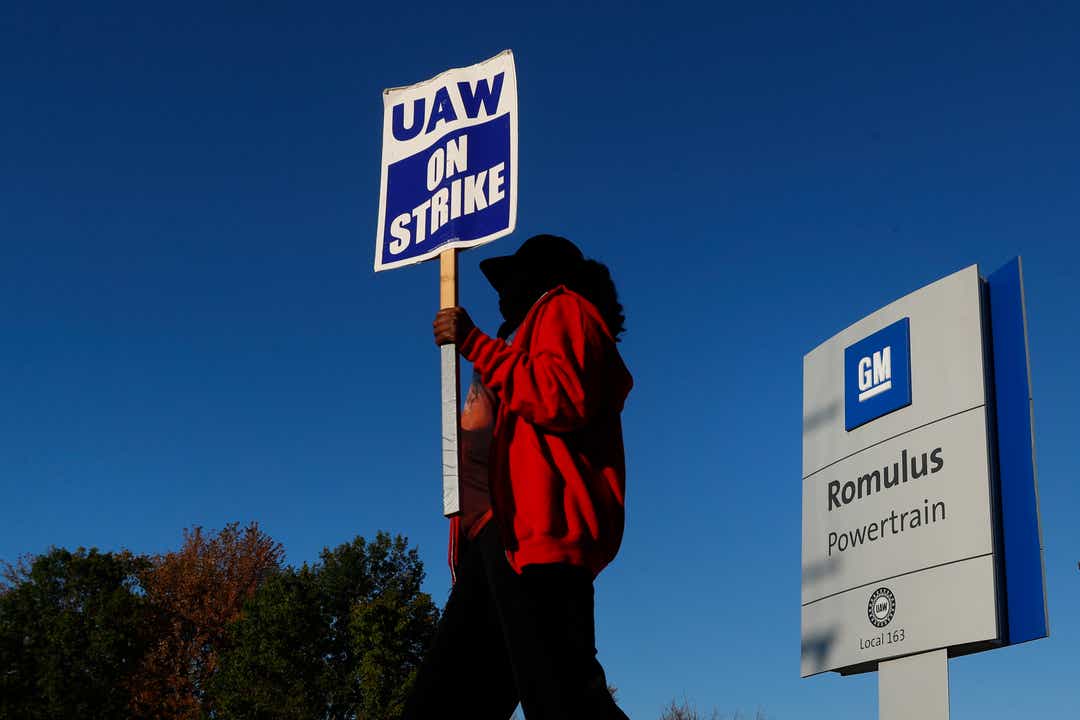The United Auto Workers has seen its membership — and influence — dwindle over the last several decades. And that's cushioning the impact of the national strike against General Motors Co., which would have been greater two decades ago.
Look no further than the last time the labor union went on strike against GM for more than two days. Some 3,400 UAW members walked off the job for 54 days at the Flint Metal Center in 1998. That resulted in 193,000 layoffs due to the ripple effect of production stoppages at GM plants around the country.
By the second week, then-President Bill Clinton had publicly called for a resolution. GM lost around $4.5 billion over the course of the walkout, which would be more than $7 billion today.
That was the result of a strike at a single plant.
In 1970, some 340,000 GM-UAW members walked off the job in a national strike. The UAW had the same number of members in its GM segment then as it has in nearly the entire UAW now. The union reported it had 395,703 members last year. That's roughly one-quarter of its 1979 peak of about 1.5 million members.

As the ongoing national strike against GM by the UAW stretches into a fifth week, the economic impact of the strike has been minimal outside of Michigan and in individual cities with GM plants and automotive suppliers that have laid off workers as a result of the walkout.
"The UAW is in a much weaker position," said Patrick Anderson, CEO of the East Lansing-based Anderson Economic Group. "There's no question that if we had a strike of this duration two decades ago, I wouldn't be one of the only people pointing out that there was a recession risk. You would have seen pain much sooner."
The UAW declined to comment.
This strike has cost the automaker around $1.13 billion. The 46,000 UAW members walking picket lines outside 55 GM facilities are getting by on $250 weekly strike pay. About 100 suppliers have laid off 12,000 workers since the strike started.
A report issued last week by the U.S. Bureau of Labor Statistics shows the manufacturing sector lost 2,000 jobs during the month of September, though economists didn't attribute that to the strike that began halfway through the month. Grant Thornton LLP Chief Economist Diane Swonk attributed that contraction to "weakness related to tariffs and trade."
The full national impact of the walkout will not start to become clear until the October employment report comes out Nov. 1, she said. Depending on when the strike ends, she expects it will have "a very small impact" on the third quarter, but she expects those losses to be recouped over the remainder of the year.
"It does have spillover effects," Swonk said. "It is affecting suppliers, and it is affecting production in both the U.S. and in Canada, but GM isn't as big as it once was, and the effects are smaller than they once were."
East Lansing's Anderson Economic Group estimated employees have lost $624 million in wages nationwide; there has been $250 million lost in federal tax revenue. Closer to home, Michigan has lost $13.8 million in tax revenue.
A greater number of automotive suppliers are feeling the pinch during the ongoing strike than they might have just a decade ago because carmakers outsource more parts now.
"The economic impact is still pretty big," said Kristin Dziczek, vice president of industry, labor and economics at Ann Arbor's Center for Automotive Research. "It's just that they don't all work for GM anymore."
Anderson and Dziczek said UAW membership has fallen — especially at GM — due to reasons largely outside the union's control.
In 1985, auto workers in Canada split into their own Canadian Auto Workers union, which has since combined with Unifor. And in the 1990s, GM sold off its parts businesses such as Detroit-based American Axle & Manufacturing Inc. and what is now Aptiv PLC.
A restructuring of GM following the 2008 bankruptcy shuttered some plants. The automaker has moved some production outside the U.S.; its San Luis Potosi Assembly plant in Mexico opened in 2008.
More recently under CEO Mary Barra, GM has pushed to control fixed costs and is a much more disciplined company. It has turned to more suppliers to build components for GM products, and moved some work in the plants, such as janitorial work, outside of the company.
As Anderson sees it, "General Motors is an entirely different company. It's a company that sells a majority of its products in China, not the U.S."
The automaker's U.S. market share in 2000 was near 30%; by 2018, that share had fallen to about 17%. Stalling U.S. sales don't hit as hard as they once did because the automaker sells so many of its products outside the U.S.
“When I started there was 300,000 of us," said Robert Gidley, 65, a 41-year toolmaker at GM's Romulus engine plant. "We’re at about 48,000 now. It’s a different time."
ithibodeau@detroitnews.com
Twitter: @Ian_Thibodeau
Staff writers Breana Noble and Kalea Hall contributed.
https://www.detroitnews.com/story/business/autos/general-motors/2019/10/14/smaller-numbers-united-auto-workers-dampen-gm-strike-impact/3918658002/
2019-10-14 04:01:00Z
52780407765151
Tidak ada komentar:
Posting Komentar